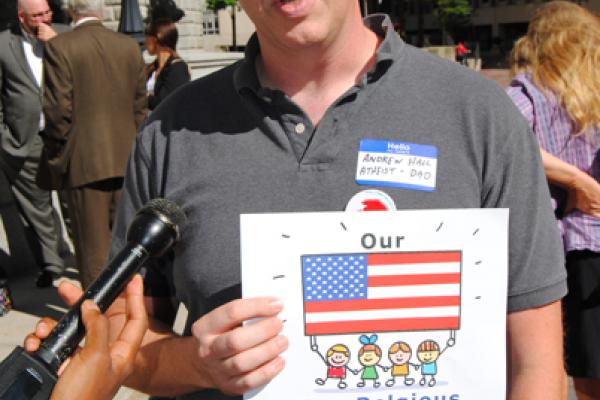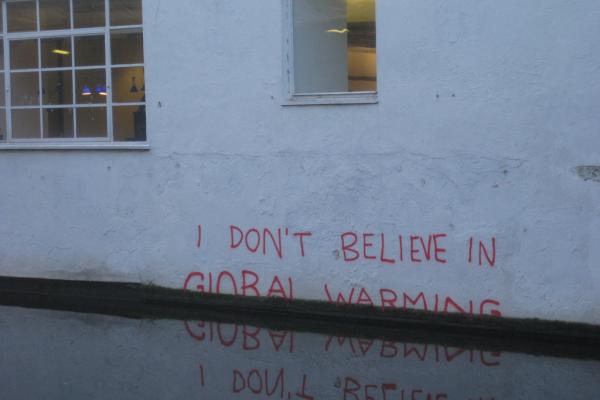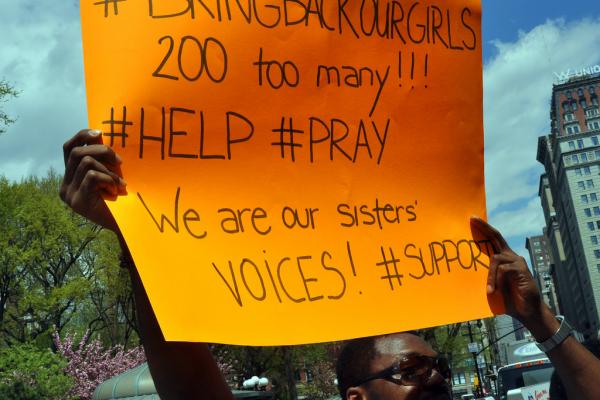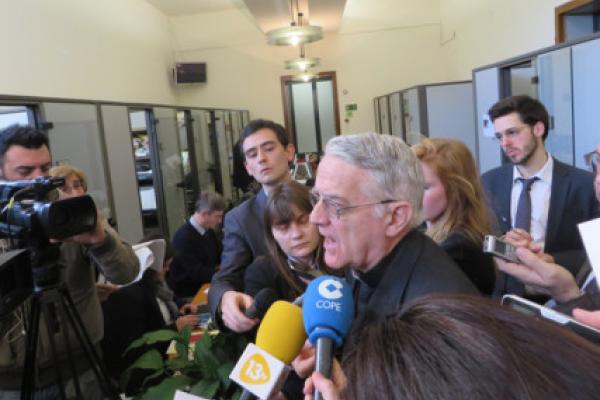The highest court in Massachusetts upheld the legality of the phrase “under God” in the Pledge of Allegiance on Friday, dealing a blow to atheist groups who challenged the pledge on anti-discrimination grounds.
The Massachusetts Supreme Judicial Court said the daily, teacher-led recitation of the pledge in state public schools does not violate the state’s equal rights amendment and is not discriminatory against the children of atheists, humanists, and other nontheists.
The ruling marks the second legal loss for atheists this week. On Monday, the U.S. Supreme Court ruled that sectarian prayers given before government meetings were not a violation of the First Amendment’s guarantee of separation of church and state.
Dear Brothers and Sisters in Christ,
In the Bible, there is a story of when Jesus was teaching a large crowd. At the conclusion his disciples observed that it was late in the day, they were in a lonely place, and the people were hungry with no food to eat. Jesus responded by telling them, "You feed them." The disciples immediately panicked and pointed out that doing so would be massively expensive, costing up to eight months of a man’s wages. They also implied that they did not have enough money to make even a dent in that need. Undeterred, Jesus asked them what they did have. They went out and returned with a young boy who was willing to share his five small loaves and two little fish. Jesus took it, looked up to heaven, and GAVE THANKS! Then he just started passing out the food. And not only did more than 5,000 people eat to their heart's content, but afterward the disciples picked up 12 baskets full of leftovers! (See Mark 6:30-44 and John 6:1-15)
Did you ever stop to wonder how the young boy who gave his lunch to Jesus felt? Can you imagine the exhilaration he must have had watching his five small loaves and two little fish feed a crowd of well over 5,000 people? I bet he went home and told that story over and over and over again. He probably felt like, as long as he was with Jesus, anything was possible.
One young boy who was willing to share his simple lunch was all Jesus needed to meet the overwhelming needs of a very hungry crowd.
As a mental health professional and a mom, I have come to appreciate the incredible importance of family relationships on the development and maturation of children. I’ve also realized that the archetypal family relationships worshipped in our (Christian and secular) culture often have little to do with the real sweat and blood of family life.
My husband and I have a running joke that one day we will start an “ambiguous family relationships” greeting card company. Our imaginary company is designed for those experiencing family situations that aren’t exactly addressed on the cheerful card aisle. Mother’s Day is prime among those occasions that seems to call for our imaginary company’s services. While the consumerist culture portrays images of wonderful family relationships rewarding the hardworking mom with leisure and jewelry, Mother’s Day is not joy and leisure for all. It can be a time of irony and pain for those who have experienced relationship loss, infertility, miscarriage, separation, or death. Mother’s Day in many ways has become a cultural enforcement of the middle class ideal rather than recognition of the real pain and sacrifice of mothers worldwide.
Dear friend,
The diagnoses are grim. Fervent supporters and ardent critics of religion both point to your decline. An urgency, if not an all-out alarm, fills the air. There are those who hope beyond hope for your renewal and transformation. Others stand steadfastly by your side as they "wait and see." Still others wipe their hands of the whole ugly mess and leave you to your ever-more-inevitable demise.
I'm not sure what to do. But I know I love you.
I know that you have grown weary in a bewildering, fast-paced world less inclined to pause and listen in. I know you have clung to models of leadership, governance, and programming through which you reached prominence, but now seem sluggish in the world today. I know you have tried new methods and "relevant" techniques for attracting new life, but they did not pan out like you dreamed. I know you have been let down by ministerial leadership, and not just in the pulpit: in the boardroom, in the choir lofts, in the denominational office. In this time of shrinking attendance, recycled ideas, and diminishing resolve, I'm not sure what the magic cure is. Or if there ever was one. But I know I love you.
You left groceries on my family's doorstep when my parents could not make ends meet. You carried the weight of my family's grief when my sister drowned. You encouraged me when I felt so alone and afraid. You challenged me to live beyond myself and for those who are so often ignored. You surrounded me with gentleness and love on my wedding day. You gave me time-worn words and melodies to express the joy and lament of my spirit. You pointed to a holy feast big enough to include all of humanity, and you set a place at that table for me.
You introduced me to God.
Dear Church,
I received some distressing news today. Oh, I know you thought you’d kept it secret, but I answered the phone when the doctor’s office called to change your chemo appointment.
Chemo? Seriously? What, you thought I wouldn’t find out eventually? I know I seem preoccupied sometimes, but I’m not an idiot. I can see the signs.
I knew something was up when I saw you shrinking, little by little over time. Maybe other people couldn’t tell, but I suspected something bad was going on. You can paste on a smile, and listen to your happy music, and buy new stuff. But anyone who really knows you, realizes your body has been slowly betraying you.
Dying happens. I get that. What really makes me mad, though, is that you didn’t trust me enough to tell me. Maybe you didn’t know for awhile. I guess that’s possible. But the doctor had to have told you, right? I mean, at some point you decided to do something about it — if only to keep it a secret. And if you didn’t know, then you’re not who I thought you were.
This week the National Climate Assessment Report was released, documenting the disruptions already being experienced due to global warming. President Obama has tried to raise the alarm by talking about the Report with weather reporters in different cities.
What’s amazing to me are not the findings of the report. More flooding, extreme temperatures, drought, severe wildfires — these have been predicted for years. And the crushing effects of global warming around the world are felt most by the poor and marginalized.
On April 15, terrorists from Boko Haram abducted more than 200 Nigerian girls sleeping in their high school dormitory. The girls awoke to a nightmare of violent gunfire as the terrorists forced them into their vehicles and vanished.
Recently the leader of Boko Haram has garnered media attention with his video arrogantly taking credit for the kidnapping. He added a religious element to his repulsive actions:
“I abducted your girls. I will sell them in the market, by Allah. There is a market for selling humans. Allah says I should sell. He commands me to sell. I will sell women.”
Omid Safi, professor of Islamic Studies at the University of North Carolina at Chapel Hill, wrote an impassioned response to Boko Haram’s leader that speaks for me: “Human beings are not for sale…This is the bastardization of Islam, of decency, of liberation, of all that is good and beautiful.”
Dear church,
Let me start off this letter by expressing my deep love and appreciation for you. I have been an active participant in the community of faith for about 10 years now, and I have been profoundly blessed, cared for, loved, and inspired to be a better human being through you. I have also seen — and even participated in — some of your ugliest and most unfaithful moments in recent history. But through all of these experiences, nothing but utter appreciation and love remains for you. I believe, in the words of Bill Hybels, that the church is the hope of the world. I believe in your great power and potential to renew and reconcile our broken world through the way of Jesus. I believe that you can do it. That we can do it, together.
With that said, there has been a lot of talk recently about your impending death. For a long time, I believed the hype. I saw the numbers of millennials who were walking away from the churches and both mainline and evangelical churches closing their doors. I was convinced that maybe the church had truly seen the end.
But I was recently reminded that what we have been witnessing in the West is not, in fact, the death of the church at all.
“Redskins.” The name of Washington, D.C.’s football team is a racial slur, a racist epithet. The U.S. trademark office agrees; so does the dictionary. But more importantly, Native American people feel it. How important is that to the rest of us? That is the moral question for all of us: are we going to show respect for our nation’s original citizens?
In an insightful column for the Chicago Tribune, Clarence Page compared NBA Commissioner Adam Silver’s decision to ban Clippers owner Donald Sterling “for life” for his private racist comments, with the decision yet to be made by the NFL and Washington’s owner to change a name deeply perceived as a public racist comment. “That’s the question at the heart in the name dispute. Who gets respect,” says Page.
Think about the name. Say it in your head or out loud in a private space. What comes to mind? Try to imagine why Native Americans feel the way they do.
The Vatican issued an urgent appeal Thursday for the release of more than 200 Nigerian schoolgirls kidnapped by the Islamist militant group Boko Haram.
“The denial of any kind of respect for life and for the dignity of human beings, even the most innocent, vulnerable and defenseless, calls for the strongest condemnation,” Lombardi said.
He added that the kidnappings aroused the most heartfelt feelings of compassion for the victims and a sense of horror for the physical and spiritual suffering and the incredible humiliation they have suffered.








